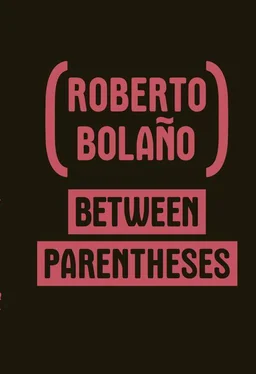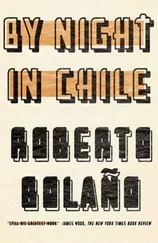Roberto Bolaño - Between Parentheses - Essays, Articles and Speeches, 1998-2003
Здесь есть возможность читать онлайн «Roberto Bolaño - Between Parentheses - Essays, Articles and Speeches, 1998-2003» весь текст электронной книги совершенно бесплатно (целиком полную версию без сокращений). В некоторых случаях можно слушать аудио, скачать через торрент в формате fb2 и присутствует краткое содержание. Год выпуска: 2011, Издательство: New Directions, Жанр: Публицистика, Критика, на английском языке. Описание произведения, (предисловие) а так же отзывы посетителей доступны на портале библиотеки ЛибКат.
- Название:Between Parentheses: Essays, Articles and Speeches, 1998-2003
- Автор:
- Издательство:New Directions
- Жанр:
- Год:2011
- ISBN:нет данных
- Рейтинг книги:4 / 5. Голосов: 1
-
Избранное:Добавить в избранное
- Отзывы:
-
Ваша оценка:
- 80
- 1
- 2
- 3
- 4
- 5
Between Parentheses: Essays, Articles and Speeches, 1998-2003: краткое содержание, описание и аннотация
Предлагаем к чтению аннотацию, описание, краткое содержание или предисловие (зависит от того, что написал сам автор книги «Between Parentheses: Essays, Articles and Speeches, 1998-2003»). Если вы не нашли необходимую информацию о книге — напишите в комментариях, мы постараемся отыскать её.
The Savage Detectives
Between Parenthese
Between Parentheses: Essays, Articles and Speeches, 1998-2003 — читать онлайн бесплатно полную книгу (весь текст) целиком
Ниже представлен текст книги, разбитый по страницам. Система сохранения места последней прочитанной страницы, позволяет с удобством читать онлайн бесплатно книгу «Between Parentheses: Essays, Articles and Speeches, 1998-2003», без необходимости каждый раз заново искать на чём Вы остановились. Поставьте закладку, и сможете в любой момент перейти на страницу, на которой закончили чтение.
Интервал:
Закладка:
Sterne owes much to Cervantes, and in the nineteenth century, the century of the novel par excellence, so does Dickens. Neither of the two, it almost goes without saying, spoke Spanish, by which one can deduce that they read the adventures of Don Quixote in English. The wonderful thing — and yet also the natural thing, in this case — is that those translations of Don Quixote , good or not, were able to convey what, in the case of Quevedo or Góngora, wasn’t conveyable and probably never will be: the quality that distinguishes an absolute masterpiece from an ordinary masterpiece, or, if such a thing exists, the quality that distinguishes a living literature, a literature that belongs to all mankind, from a literature that’s only the heritage of a certain tribe or a part of a certain tribe.
Borges, who wrote absolute masterpieces, explained it once already. Here’s the story: Borges goes to the theater to see a production of Macbeth . The translation is terrible, the production is terrible, the actors are terrible, the staging is terrible. Even the seats are uncomfortable. And yet when the lights go down and the play begins, the spectators, Borges among them, are immersed once again in the fate of characters who traverse time, shivering once again at what for lack of a better word we can call magic.
Something similar happens with the popular Passion plays, in which the eager amateur actors who once a year stage the crucifixion of Christ manage to transcend the most dreadful absurdity or unconscious heresy on the wings of divine mystery, which isn’t actually divine mystery but art.
How to recognize a work of art? How to separate it, even if just for a moment, from its critical apparatus, its exegetes, its tireless plagiarizers, its belittlers, its final lonely fate? Easy. Let it be translated. Let its translator be far from brilliant. Rip pages from it at random. Leave it lying in an attic. If after all of this a kid comes along and reads it, and after reading makes it his own, and is faithful to it (or unfaithful, whichever) and reinterprets it and accompanies it on its voyage to the edge, and both are enriched and the kid adds an ounce of value to its original value, then we have something before us, a machine or a book, capable of speaking to all human beings: not a plowed field but a mountain, not the image of a dark forest but the dark forest, not a flock of birds but the Nightingale.
HUMOR IN THE WINGS
Cortázar complained that there was no tradition of erotic literature in Latin America. He could have just as well have complained about the lack of a comic tradition. The classics, for lack of a better name — I mean the classics of our developing countries — sacrificed humor in favor of saccharine romanticism and pedagogy, or in some cases protest. None of these works stand the passage of time very well and if they survive, they owe their endurance to the efforts of the bibliophile rather than to any real value or substance.
In the work of some early modernists or vanguardists, however, one can find instances of genuine humor. They’re scarce, but they’re real. I’m thinking about Tablada, a few obscure texts by Amado Nervo, fragments of prose by Darío, tales of horror and comedy by Lugones, the first forays of Macedonio Fernández. It’s possible — especially in the case of Nervo — that this humor is involuntary. There are also excellent prose writers and poets in whose work humor is striking for its absence. Martí is the great example of this kind of writer, despite The Golden Age .
It could be said that in rural, provincial Latin America humor was an exercise in decadence and that it was only reborn with the mass arrival of immigrants at the beginning of the twentieth century. Our forbears, who in intellectual matters were almost always boors, were unfamiliar with Voltaire and Diderot and Lichtenberg, and, even worse, they had never read — or scarcely read, or only claimed to have read, lying through their teeth — the Archpriest of Hita, Cervantes, Quevedo.
It was the twentieth century when humor timidly assumed a place in our literature. Its practitioners, of course, are a minority. Most writers turn out lyric or epic verse or revel in imagining the superman or the ideal leader of the proletariat or in plucking the petals from the little flowers of the Holy Mother Church. Those who laugh (and their laughter is often bitter) can be counted on the fingers of two hands. There’s no question that Borges and Bioy wrote the best humorous fiction, in the guise of H. Bustos Domecq, a pseudonymous creation often more real, if that makes sense, than the pseudonymous creations of Pessoa, and whose stories, from the Six Problems for Don Isidro Parodi to the Chronicles of Bustos Domecq should be part of any anthology that isn’t just trash, as Don Honorio himself might put it. Or not.
Few writers follow the same course as Borges and Bioy. Cortázar, of course, but not Arlt, who, like Onetti, opts for the parched and silent abyss. Vargas Llosa in two books and Manuel Puig in two, but not Sábato or Reinaldo Arenas, who contemplate spellbound our collective fate. In poetry, once a refuge for laughter, the situation is much worse: one might say that all Latin American poets, whether naïve or flat-out idiots, vacillate between Shelley and Byron, between Darío’s impossible fluency and Nerudian career aspirations. Intoxicated with lyricism, intoxicated with otherness, Latin American poetry is marching rapidly toward destruction. The camp of what in Chile is very fittingly called serious fools grows ever larger. If we reread Paz or Huidobro we notice the absence of humor, an absence that in the end is a comfortable mask, a mask of stone. Thank goodness we have Nicanor Parra. Thank goodness Parra’s tribe has yet to lay down arms.
¶[Yes, my little hypocrite, that’s Putins as in Vladimir, not some Mexican slang version of putas (or putos ).] [ hookers ( or pimps) — tr.]
4. Scenes
Town Crier of Blanes
First of all I have to thank the mayor, Ramón Ramos, and all those who had the foolish idea of asking me to deliver the holiday address for the new year, 1999, which as far as I’m concerned is the last year of the millennium, no matter what people who know something about mathematics say. Whether we’ve changed centuries or millennia or not, the coming year will be something new. It’ll be the year 2000 and it will be different. A year is like a coat or a cape, sometimes a shirt, even a handkerchief. In fact: sometimes a year is like a Kleenex. And when we wrap ourselves in the year 2000 or blow our noses into the year 2000, our perception of time will somehow have changed. So I’m very happy to be bringing in the year 1999, a year that I’ve come to know very well and that I don’t see as a handkerchief (much less a Kleenex), or even a coat, but rather a T-shirt, a big old T-shirt in which I feel completely comfortable. But I was saying something else. I was saying that I’m grateful for the mayor’s invitation. Of course I’m grateful. I’ll try to say it without self-dramatizing: I’m grateful. It’s an honor for me. An undeserved honor, as it happens, because I’m sure there are better qualified people to call in the new year. A few years ago, Àngel Planells, the most modest of the Catalan surrealist painters, spoke these words in his Blanes holiday address: “ També vull demanar perdó a tots vosaltres perquè aquí han vingut persones de molta memòria, de molta categoria y de molt valer, i jo sóc un nouvingut només .”** The Planells who said what you’ve just heard me say in my atrocious Catalan was eighty-six-years old and he was without a doubt someone who did honor to the post of town crier. And even so, wise old Planells said: “ sóc un nouvingut només .” And he also said: “ Us adverteixo que no vull fer cap conferència, sinó només una petita xerrameca el més informal possible. Encara que, tractant-se de mi, ja se sap que ha de ser una cosa informal, perquè de formalitat jo només en vaig tenir el dia que em vaig casar. ”†† And two years later he died in Barcelona as quietly as he had lived. I hope that my address will be worthy of such an illustrious predecessor. I hope my petita xerrameca won’t be too formal and that if Àngel Planells could hear it he would say “ no està mal, jove .”
Читать дальшеИнтервал:
Закладка:
Похожие книги на «Between Parentheses: Essays, Articles and Speeches, 1998-2003»
Представляем Вашему вниманию похожие книги на «Between Parentheses: Essays, Articles and Speeches, 1998-2003» списком для выбора. Мы отобрали схожую по названию и смыслу литературу в надежде предоставить читателям больше вариантов отыскать новые, интересные, ещё непрочитанные произведения.
Обсуждение, отзывы о книге «Between Parentheses: Essays, Articles and Speeches, 1998-2003» и просто собственные мнения читателей. Оставьте ваши комментарии, напишите, что Вы думаете о произведении, его смысле или главных героях. Укажите что конкретно понравилось, а что нет, и почему Вы так считаете.












